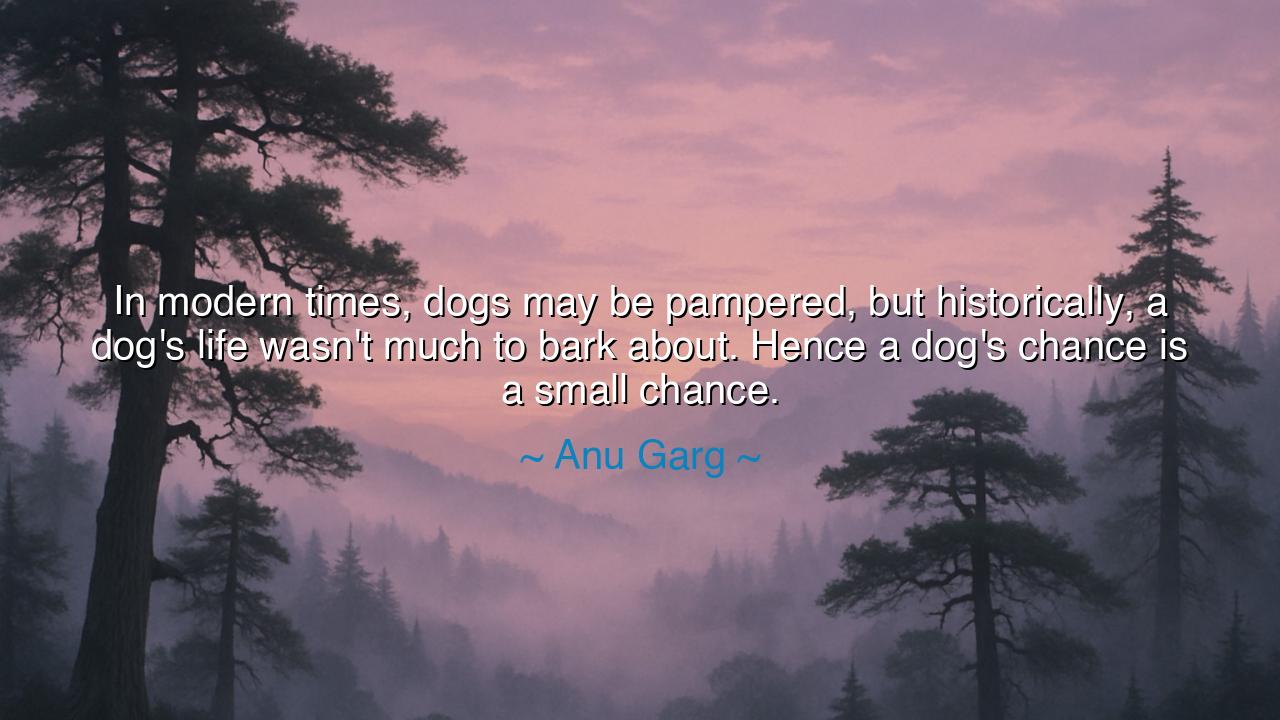
In modern times, dogs may be pampered, but historically, a dog's
In modern times, dogs may be pampered, but historically, a dog's life wasn't much to bark about. Hence a dog's chance is a small chance.






In the vast continuum of human history, the role and status of animals have been shaped by the ebb and flow of time, culture, and societal needs. Anu Garg, in his thought-provoking words, offers a reflection on the fate of the dog: “In modern times, dogs may be pampered, but historically, a dog’s life wasn’t much to bark about. Hence a dog’s chance is a small chance.” These words remind us that the life of a dog—though beloved and cherished in the present day—was once far less glamorous, and the chances for a dog to rise above its humble station were virtually non-existent. In the ancient world, the dog was often seen not as a companion, but as a working animal, valued for its utility rather than its affection.
In the ancient world, the dog was viewed through a practical lens. To the Greeks and Romans, the dog was an essential tool in the hunt, a guardian of flocks, and a protector of homes, but not a creature to be pampered or adored. The famed Greek philosopher Aristotle once said that a dog’s purpose was to serve the human—a noble creature, but still subject to the whims of human needs. The Romans, too, valued dogs not for their loyalty, but for their utility. In the ancient world, the dog’s chance at a life of comfort or honor was small, and they were often treated as mere working animals, existing in a world where survival was dictated by necessity and function.
Consider the story of Cirius, the mythological figure from Roman lore. A loyal hound, Cirius was not celebrated for its kindness, but for its strength and courage in battle. Cirius, like many dogs of ancient times, was revered for its ability to serve the master, but its life was often harsh. Such dogs worked tirelessly, without the expectation of reward or comfort. The dog’s chance at a peaceful or revered life was slim; rather, its purpose was determined by its ability to serve in a practical sense, often at the expense of its own well-being.
Fast forward to the present, and dogs have evolved into more than just companions or workers. Today, they are often treated as beloved family members, pampered with gourmet meals, soft beds, and regular trips to the vet. This drastic shift in societal treatment of dogs speaks to the changing nature of humanity itself—an era where compassion and emotion have led us to see dogs as equals, deserving of care and respect. But Garg’s quote reminds us that this change has not always been the case. The chances for a dog to rise above its station in earlier centuries were slim, and its role was often confined to serving the more powerful, the wealthy, or the powerful.
Even in the modern era, the disparity between the treatment of dogs and humans reflects the unequal nature of our world. While a dog’s life may now be filled with luxury, we must remember that the dog, much like the humble servant of ancient times, was once subject to a different set of circumstances. For the average dog, survival in the past was far from guaranteed. The dog had to rely on chance—whether it was chosen to be the companion of a wealthy noble or relegated to the back alleys and streets. In earlier times, even the most faithful of dogs often lived with little more than the hope of being fed and cared for, and their chance of leading a fulfilling life was often small.
What, then, can we learn from Garg’s reflection? The lesson lies in the realization that circumstances shape the lives of all creatures—human or animal. Just as a dog’s chance of a life of ease was once small, so too are the chances for many humans born into difficult conditions. Society, whether in the ancient world or today, often shapes the opportunities of individuals based on their station. However, we must also recognize the power of compassion, for it is the compassion of humanity that has allowed us to change the story of the dog, just as it can change the story of those who are less fortunate among us.
As we look to our own lives, let us remember the power of circumstance and the role of chance. Many of us are born into privilege, while others are born into hardship. But just as the humble dog has been transformed through the compassion and care of humanity, so too can we seek to bring that same compassion to those whose chances in life may be small. Let us extend our empathy to all creatures, human and animal alike, recognizing that change is possible when we choose to alter the conditions that limit opportunity. Like the dog, we all deserve a chance, and in our hands, we hold the power to provide that opportunity to others.
Let us, then, act with kindness, for the chances of others may be small, but through our compassion, we can help them rise to greater heights. Whether it is the dog or the human, the chance of a better life is not to be taken for granted.






AAdministratorAdministrator
Welcome, honored guests. Please leave a comment, we will respond soon